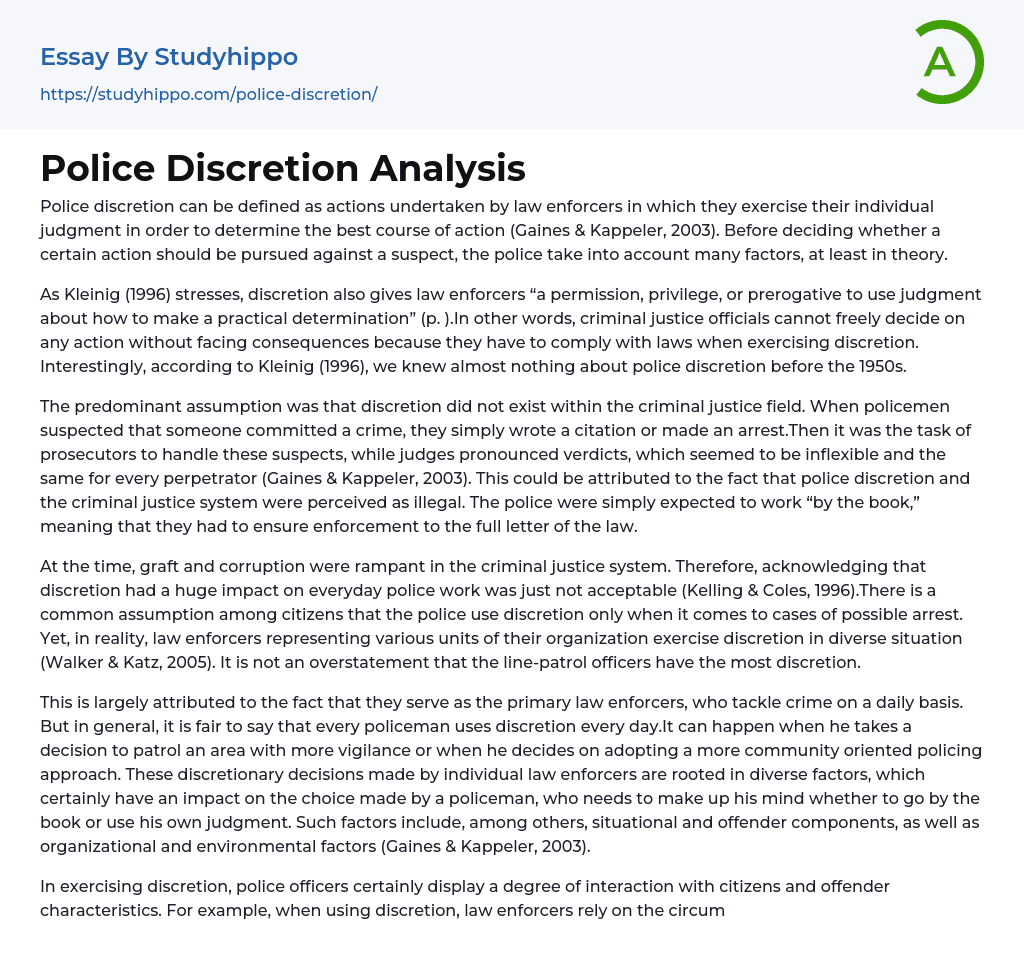In accordance with Gaines and Kappeler (2003), police discretion denotes the application of individual discernment by law enforcement officials to ascertain the most appropriate measure. Theoretically, the police consider diverse elements before concluding whether or not to prosecute an offender.
According to Kleinig (1996), discretion in law enforcement includes the ability to make practical judgments, but officials must still follow laws. Consequences follow when discretion is not employed properly. It's noteworthy that we had limited knowledge about police discretion before the 1950s.
According to Gaines and Kappeler (2003), the criminal justice industry was widely thought to lack discretion. Police officers were believed to have no room for judgment when it came to suspected criminals, as they would either issue a citation or make an arrest. From there, prosecutors and judges would take over with verdicts appearing
...uniform for all offenders. This perception may have been due to a belief that police discretion and the criminal justice system were against the law, requiring strict adherence to protocol without exception.
Back then, corruption and graft were prevalent in the criminal justice system, making it unacceptable to acknowledge the significant influence of discretion on daily police duties (Kelling ; Coles, 1996). Though citizens assume that discretion is only exercised in potential arrest scenarios, law enforcers across various units of their organization demonstrate discretion in different situations (Walker ; Katz, 2005). It is true that line-patrol officers possess the highest extent of discretion.
The primary reason for policemen using discretion daily is that they are the primary enforcers of the law and deal with crime on a daily basis. However, it is generally true that every policeman exercises discretion daily, whether it
is by choosing to patrol an area with more vigilance or adopting a more community-oriented approach to policing. These discretionary decisions are based on various factors, such as situational and offender components, organizational and environmental factors, all of which influence the decision-making of a policeman who has to choose between following established protocols or relying on his own judgment. (Gaines ; Kappeler, 2003).
Police officers demonstrate interaction with citizens and offender characteristics through their discretionary actions. Such acts rely on both the situation's circumstances and the suspect's conduct, including their criminal history, the severity of the alleged crime, as well as their race, ethnicity, and gender (Gaines ; Kappeler, 2003). The discretion exercised by law enforcers is also impacted by organizational factors.
The official policy enforced by a law enforcer's department and the informal organization culture typically represent police discretion (Gaines & Kappeler, 2003). Additionally, environmental variables play a role in this equation. It is important to note that local political culture has little influence as all policed communities have unique characteristics regarding size and demographics, which affects policies and practices.
- Animal Cruelty essays
- Law Enforcement essays
- Juvenile Justice System essays
- Surveillance essays
- Forensic Science essays
- Crime Prevention essays
- Criminal Justice essays
- Criminology essays
- Drug Trafficking essays
- Juvenile Delinquency essays
- Organized Crime essays
- Penology essays
- Prison essays
- Property Crime essays
- Punishment essays
- Serial Killer essays
- Sexual Offence essays
- Victim essays
- Crime scene essays
- Punishments essays
- Charles Manson essays
- Juvenile Crime essays
- Piracy essays
- Stealing essays
- Gang essays
- Hate Crime essays
- Homicide essays
- Damages essays
- Murder essays
- Robbery essays
- Ted Bundy essays
- Prostitution essays
- Violent crime essays
- Rape essays
- Identity Theft essays
- Sexual Harassment essays
- Distracted Driving essays
- Drunk Driving essays
- Detention essays
- Sexual Assault essays
- Sexual Assault on College Campuses essays
- Cyber Crime essays
- White Collar Crime essays
- Fur essays
- Federal Bureau Of Investigation essays
- Fire Department essays
- Criminal Justice System essays
- Commitment essays
- Mass Incarceration essays
- Kill essays




